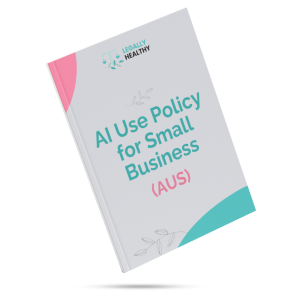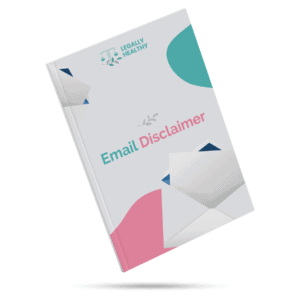Email marketing often feels like one of those things you “should” be doing—but between clinical work, client calls, and running your practice, it usually falls into the too-hard basket.
But here’s the thing: email is still one of the most effective tools you have to build trust, nurture client relationships, and grow your health business in a sustainable way. Social media is great for visibility—but your email list is where deeper connection happens. It’s where you build a community that wants to hear from you, and where you can serve and sell ethically without feeling pushy.
Whether you’re just starting your list or ready to improve what you already have, here are the strategies I use (and teach my clients) to keep email marketing consistent, compliant, and aligned with a values-driven health practice.
1. Know Your Audience (and Talk to Them)
Before you write a single subject line, ask yourself: who am I writing to?
Your clients and subscribers don’t want generic newsletters—they want to feel understood. Segmenting your list (for example: current clients, past clients, waitlist, retreat interest, product buyers, etc.) allows you to speak directly to the people who need what you offer right now.
It also allows you to avoid bombarding people with irrelevant content or offers, which increases trust and reduces unsubscribes.
2. Keep It Clear and Actionable
Every email you send should have a clear purpose. Are you…
-
Announcing a new program?
-
Inviting them to book a session?
-
Sharing helpful content?
-
Asking for feedback?
Whatever the goal, make your Call to Action (CTA) obvious and easy to follow. Use buttons, bold text, and simple language like “Click here to read more” or “Book your session now.”
The fewer decisions your reader has to make, the better.
3. Subject Lines Matter More Than You Think
You could write the most helpful, heartfelt email—but if no one opens it, it won’t matter. Your subject line is your first (and sometimes only) chance to capture attention.
Here’s what I’ve found works well:
-
Be specific: “3 ways to boost energy during perimenopause”
-
Be curious: “This mistake might be costing you clients…”
-
Be helpful: “Free guide: How to prep for your first consult”
Avoid clickbait. Instead, aim for clarity + curiosity. And if you’re not sure what works for your audience? Test two versions and see which one performs better.
4. Automate the Essentials
Don’t stress about sending weekly emails right away. Focus on setting up a few essential automations that work in the background:
-
A warm, helpful welcome sequence for new subscribers
-
Booking confirmations and reminders (if not handled elsewhere)
-
A check-in email 4–6 weeks after a session or purchase
-
A re-engagement email if someone hasn’t opened your emails in 90+ days
These simple automations keep your brand top-of-mind and make your practice feel polished—without you having to manually manage it all.
5. Educate and Empower, Don’t Just Sell
Your emails don’t always have to lead to a sale. Some of the best-performing emails are educational, story-based, or even just helpful reminders.
You might share:
-
A favourite herbal tea recipe for better sleep
-
An explainer on gut health testing
-
A checklist for post-consult support
-
A recent client win (anonymised of course!)
When people know, like, and trust you—they’re far more likely to book, buy, or refer you.
A Quick Word on AI (Yes, Even for Email Marketing)
Let’s talk about the shiny new tool everyone’s using: Artificial Intelligence.
AI tools like ChatGPT or Jasper can be great for generating ideas, writing email drafts, or even formatting newsletters. I’ve used them myself when I’m on a deadline and just need a starting point.
BUT… if you’re using AI in your business—even just for email marketing—you need to think about your legal responsibilities.
Ask yourself:
-
Am I being transparent about using AI?
-
Am I inputting personal or sensitive data without realising?
-
Do I have anything in place to limit my liability?
If you don’t have a policy in place that outlines how your business uses AI—especially when handling client data—you’re leaving yourself exposed to both legal and reputational risk.
That’s why I created the AI Use Policy for Small Business (AUS) template. It’s written in plain English, customisable, and designed to help you:
-
Explain how you use AI across your business
-
Protect personal information and comply with the Privacy Act
-
Set clear expectations for clients, staff, and contractors
🔐 On sale now—from $99 to just $55 until the end of May!
The Email Platform I Use and Recommend
I use Flodesk for all my email marketing—because it’s not only beautiful and intuitive, but also makes automations and segmentation easy. Plus, I get so many compliments on how polished and clear my emails look (even when I’ve written them in my PJs at 11PM).
If you’re ready to make your emails look amazing and run on autopilot, you can get 50% off your first year of Flodesk using my affiliate link here.
TL;DR
-
Email is one of the most effective ways to build trust and grow your health business.
-
Keep it simple, clear, and valuable—your clients will thank you.
-
If you’re using AI, you need a policy to stay legally compliant.
You don’t need to be perfect. You just need to start. Now go write that email!
Featured Products
-
AI Use Policy for Small Business (AUS)
$97.00 Incl GST -
Email Disclaimer Template
$15.00 Incl GST


